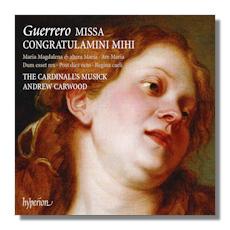
The Internet's Premier Classical Music Source
Related Links
-
F. Guerrero Reviews
Crecquillon Reviews - Latest Reviews
- More Reviews
-
By Composer
-
Collections
DVD & Blu-ray
Books
Concert Reviews
Articles/Interviews
Software
Audio
Search Amazon
Recommended Links
Site News
 CD Review
CD Review
Missa Congratulamini mihi

- Francisco Guerrero:
- Mass "Missa Congratulamini mihi" à 5
- Motet "Dum esset rex" à 5
- Motet "Maria Magdalena et altera Maria" à 6
- Motet "Post dies octo" à 5
- Motet "Regina caeli" à 4
- Motet "Ave Maria" à 8
- Motet "Regina caeli" à 8
- Thomas Crecquillon: Motet "Congratulamini mihi"
The Cardinall's Musick/Andrew Carwood
Hyperion CDA67836
The justly-acclaimed Cardinall's Musick under Andrew Carwood have barely finished the last volume of their highly successful Byrd cycle (Hyperion CDA67779) before releasing a delightful CD of warm and beautiful music from the leading Spanish composer of the previous generation to Byrd's, Francisco Guerrero; he lived from 1528 to 1599.
When interest in Renaissance music was itself rekindled in the second half of the last century the take-up of those other front-rank composers, Palestrina, Lassus, Victoria and indeed Byrd himself, seemed inevitable. Guerrero has had to wait a little longer. But his time is coming… there are over 80 CDs in the current catalog partly or wholly devoted to his sublime and penetrating music.
These are two qualities which the nine-strong Cadinall's Musick, founded in 1989 and now considered as leaders in a crowded field, emphasize in this recording. Guerrero's music somehow lifts our thoughts and hearts above the particularities and mundanities of whatever else is going on when we're experiencing it. "Ethereal" and "heavenly" would be too florid descriptions. But "elevated" and "supernal" would not. These qualities are achieved not only through singing of great grace and delicacy, but also through a quiet ambition and assuredness that Guerrero will succeed in his purpose. Listen to the forward movement of Dum esset rex [tr.8], for example. The singers never even come close to hectoring. If pressed, one would say that they are aptly "advocating" the insistence that Guerrero envisaged in setting such a text. The same goes for Maria Magdalena et altera Maria [tr.9]. The combination of easily-followed yet vivid tempi achieves this.
The main work on this CD is the uplifting Missa Congratulamini mihi, which is based on the Easter motet by the still vastly-underrated Thomas Crecquillon from the earlier generation still (c1505-c1557). It's sung with great vigor and thrust here too [tr.7] and makes a striking contrast and break between the beautiful Agnus Dei of the Mass and the six other Easter motets included in this program. They serve, too, to suggest something of the breadth of expression and liturgical insight of which Guerrero was clearly capable, and for which we was so greatly appreciated by his contemporaries. The almost extrovert sheen of the Mass is further explained by its addition of an extra treble, making a top-rich five part sound.
At the same time, the more reflective side of Guerrero's temperament (Yes, one feels that Carwood and The Cardinall's Musick have managed to capture something of the composers moods almost!) is evident in such motets as the gentler Post dies octo [tr.10], which is as concentrated and refined as it is thoughtful. The articulation of the singers leaves nothing at all to be desired. Each syllable is clean and audible. Each syllable – just as importantly – is to some purpose. The importance of the text is supreme. But Guererro's delight at setting, say, the concluding Alleluia to the Regina caeli a 4 [tr.11] as more than a simple trope but something heartfelt after the intensity of this short piece (it lasts barely two and a half minutes) is well communicated and the Tierce de Picardie gains maximum impact – so much so that the singers can even afford to hold back very slightly.
In the booklet come the full texts in Latin and English, short background notes and some biographical detail. The acoustic is giving and supportive. This is the only current recording of the Mass and most of the motets. Indeed of the Crecquillon too. The superb interpretation, transparency and singing, though, are what really commend this as an essential buy for anyone who loves Renaissance choral polyphony. Recommended unhesitatingly.
Copyright © 2010, Mark Sealey.





















